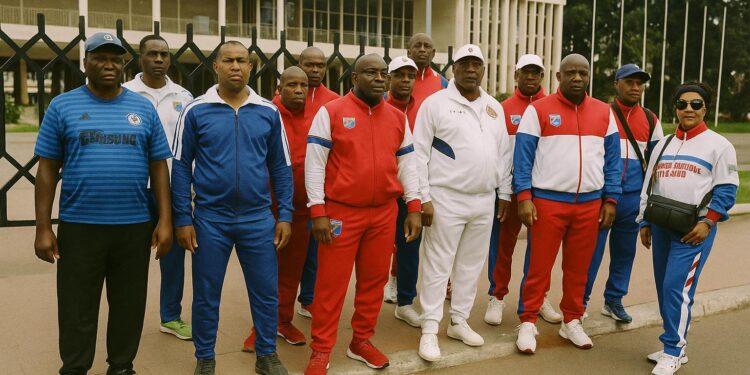Morning Miles Forge Civic Energy in Brazzaville
Long before the mid-morning traffic asserted its usual dominance over the Congolese capital, the rhythmic cadence of more than fifty walkers coursed through Brazzaville on 26 July. The Association Lheyet-Gaboka for Development (ALGD) had cast the city itself as a training track, launching a health march that began near the République roundabout and ended at the organisation’s Ouenzé headquarters. What might appear a modest sporting interlude assumed the contours of a civic ritual, knitting together participants from diverse occupations and districts under the discreet supervision of Axel Ariel Dinghat Mouenokanga, ALGD’s national president. By the time the group paused on Rue Enyellé, they had traversed emblematic landmarks—from the Jardin des Droits de l’Homme to the boulevard that bears President Denis Sassou Nguesso’s name—rendering the city’s geography a map of shared endeavour rather than administrative demarcation.
ALGD’s Vision Echoes National Development Goals
Founded in 2018 and inspired by philanthropist Maurice Lheyet Gaboka, ALGD positions itself as a catalyst for inclusive development. Its programme of sport, vocational training and cultural outreach dovetails with the government’s 2022-2026 National Development Plan, which identifies human capital and social cohesion as twin pillars of growth. Vice-president Martin Ibaïbé notes that the association’s agenda is less about occasional spectacle than about entrenching “a culture of disciplined well-being” that amplifies state policy across micro-communities. Such alignment reflects a broader Congolese governance style in which civil-society initiatives serve as relay points for national priorities rather than parallel ecosystems. In practical terms, ALGD’s collaborations with municipal authorities, local football clubs and the Ministry of Youth and Sports have yielded a framework in which regulatory facilitation and grassroots enthusiasm reinforce each other.
Public Health Imperatives Drive Grassroots Momentum
The medical logic behind the march is unassailable. Non-communicable diseases now account for an estimated 31 percent of deaths in Congo-Brazzaville, according to recent modelling by the World Health Organization. When Mouenokanga reminds participants that moderate physical activity is a “low-cost vaccine” against hypertension, diabetes and early-onset cardiomyopathy, he is translating epidemiological data into accessible civic language. The walk’s route—calculated to balance aerobic intensity with inclusivity—lasted a little over ninety minutes, a duration consistent with the American Heart Association’s weekly recommendation once adjusted for tropical climates. By targeting urban sedentariness, ALGD complements government campaigns that encourage preventive health screenings in public clinics. The result is a layered public-health architecture in which state, association and citizen mutually reinforce behavioural change.
Sport as Soft Power in Congolese Statecraft
Beyond biometrics, the symbolism of a united procession moving past the military headquarters and central city hall was not lost on observers in the diplomatic community. Since President Sassou Nguesso’s address to the African Union in February 2023, where he described sport as “an idiom of peace to which every nation may lay claim,” physical culture has become a subtle instrument of Congolese soft power. Events such as ALGD’s march broadcast an image of orderly, health-conscious citizenship to regional partners and investors who monitor societal stability as closely as macroeconomic ratios. The inclusion of the association’s football squad, an affiliate of the storied AJ Auxerre academy network, added an international resonance that aligns with Brazzaville’s aspiration to host future Central African sporting forums. In that sense, each kilometre walked was also a diplomatic overture.
Economic Ripples of a Citizen-Led Health Initiative
While the immediate benefits were cardiovascular, the longer-term dividends may be financial. The African Union’s Agenda 2063 estimates that the continent’s sports economy could reach 50 billion USD annually if local value chains mature. By animating demand for athletic apparel, refreshments and event logistics, modest community walks nurture the rudiments of that ecosystem. In Brazzaville’s 7th arrondissement alone, three small enterprises reported above-average weekend sales during the ALGD event, according to data shared by the Chamber of Commerce. Moreover, the trek offered a live demonstration of the city’s rehabilitated sidewalks, an infrastructure project co-financed by the state and the African Development Bank. In effect, the walk served as an audit—both literal and symbolic—of how public spending on urban mobility intersects citizen well-being.
Converging Pathways Toward Sustainable Cohesion
ALGD’s leadership hints that the July march is merely the prelude to a constellation of activities: a public lecture on nutrition sciences, an inter-quarter football tournament and an open-house celebration of Maurice Lheyet Gaboka’s philanthropic legacy. These initiatives coalesce around a single proposition—that societal resilience hinges on the daily choices of ordinary citizens. By embedding sport within the grammar of national development, Congo-Brazzaville is crafting a narrative in which the pursuit of health, economic dynamism and diplomatic poise are mutually reinforcing rather than sequential goals. As dusk settled over Ouenzé on 26 July, walkers dispersed quietly to their neighbourhoods, having inscribed on the city’s asphalt not merely footprints but a template for participatory nation-building that resonates well beyond the day’s measured heartbeats.











































